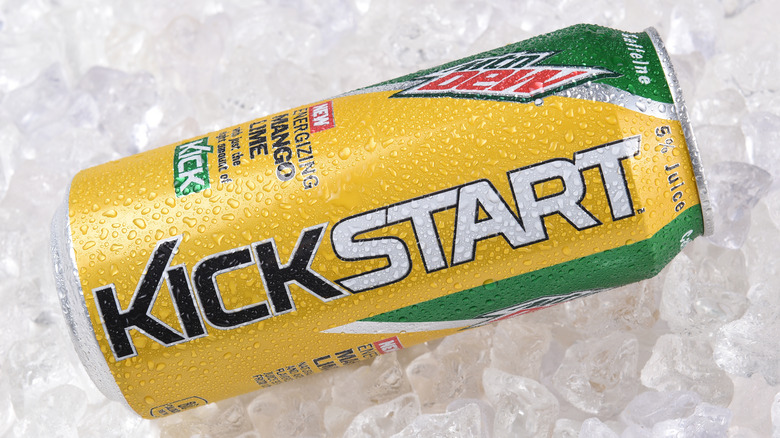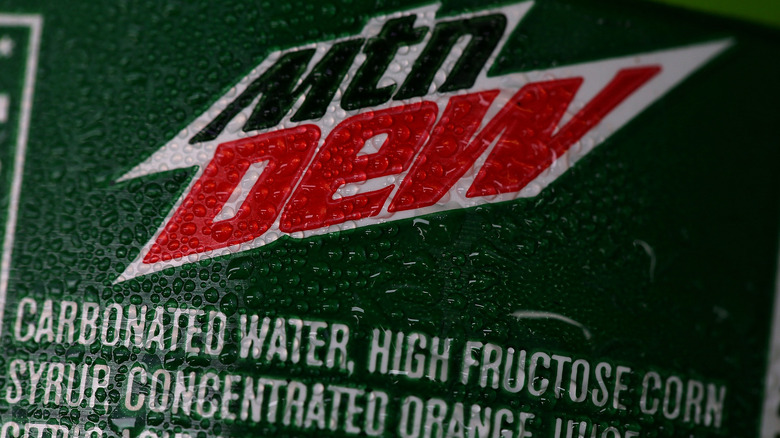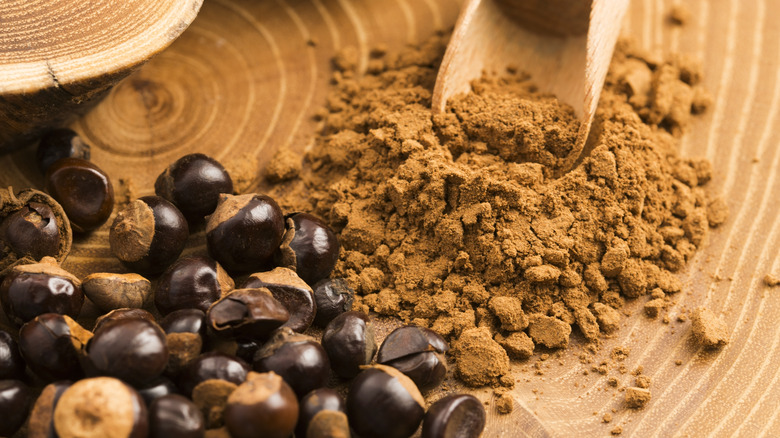Are Mountain Dew Energy Drinks Bad For You?
Energy drinks are hardly anything new. They are the second-most popular supplement on the market by young adults and teens alike, according to the National Center for Complementary and Integrative Health (NCCIH). "Men between the ages of 18 and 34 years consume the most energy drinks, and almost one-third of teens between 12 and 17 years drink them regularly," revealed the NCCIH.
There are dozens of energy drinks and shots on the market that promise to give you a boost. Mountain Dew is no different, offering several different types of beverages, including Amp, Kickstart, Game Fuel, and Rise. The drinks come in dozens of flavors — from orange citrus to black cherry to tropical punch — and they differ mainly in their caffeine and sugar content. There is little doubt that you will get a jolt of energy from guzzling a Mountain Dew energy drink or two, but are they good for you?
They have a ton of caffeine
Caffeine gives energy drinks their kick, and that can be a good thing ... sometimes. Caffeine is linked to better brain function, and it improves concentration when you are tired, according to Healthline. But how much is too much? If you are sensitive to caffeine, you may experience heart problems, high blood pressure, anxiety, headaches, insomnia, and dehydration, per Medical News Today. There is no hard and fast rule about how much caffeine you can consume, but the consensus is that you should try to stay under 400 milligrams per day (via Healthline).
Mountain Dew's energy drinks offer a wide range of caffeine portions. Mountain Dew Rise is at the top of the list with 180 milligrams of caffeine in a 16-ounce serving. Mountain Dew Amp delivers a bit less at 142 milligrams of caffeine. The company's Game Fuel beverages have 90 milligrams of the energy-boosting compound, while their Kickstart drinks contain 69 milligrams of caffeine. In comparison, an 8-ounce cup of coffee has about 80 milligrams of caffeine, per Healthline.
Some varieties contain high fructose corn syrup
With the exception of Rise, Mountain Dew's energy drinks (Amp, Kickstart, and Game Fuel) contain high fructose corn syrup. In fact, it is the second item mentioned on the ingredients list. High fructose corn syrup is used as a sweetener found in many beverages because it is cheaper to produce and sweeter than regular granulated sugar. But when it comes to digestion, the body does not necessarily treat it the same as sugar.
Dr. Mark Hyman, functional medicine physician, told the Cleveland Clinic that the body delivers fructose to the liver once it is consumed, which causes it to produce triglycerides and cholesterol. This quick delivery could mean an increase in your blood cholesterol. Hyman added that high fructose corn syrup can promote other ailments, including diabetes and inflammation. It might also contribute to leaky gut syndrome, which is linked to inflammation and type 2 diabetes.
They contain a blend of unhealthy ingredients
If you're trying to avoid any of the negative effects of high fructose corn syrup, you still have an option of Mountain Dew's Rise energy drink, which is sweetened with sucralose and aspartame. However, those two ingredients have their own dangers beginning with a link to increased glucose, cortisol, and insulin levels (via Livestrong).
There are other ingredients to consider when deciding if Mountain Dew energy drinks might be good for you. Amp and Game Fuel each contain panax ginseng root. WebMD notes that this herb might not be safe when taken for longer than six months because it could lead to insomnia and liver damage. Mountain Dew Amp also contains the herb guarana, which provides more of a stimulant quality than caffeine, per a study in PLOS One. Just like caffeine, guarana can cause nervousness, an increased heart rate, or irritability, according to MedScape.
You may feel okay after having a Mountain Dew energy drink, but your doctor would likely not recommend consuming any type of energy drink with any regularity. In fact, according to the American Academy of Family Physicians, "doctors worry about the dangers of energy drinks."




